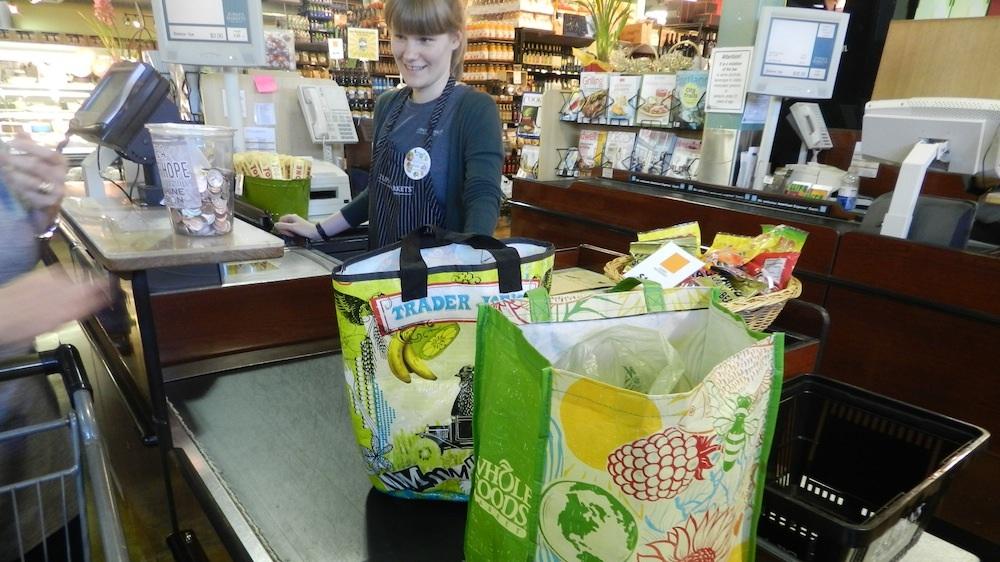
Zupan's Markets clerk Katie Miller bags a customer's groceries in reusable bags. Like other Portland grocery stores, plastic bags are banned here.
Josh Hunt
More than one million Northwest residents are living without plastic grocery bags.
That, at least, is the number of people living in Oregon and Washington cities where retail stores are no longer allowed to use single-use plastic bags.
And their numbers are growing as cities in the region continue to ban the bag.
Seattle began implementing its ban this week on single-use plastic bags at grocery stores and other retailers. Similar prohibitions are imposed in Seattle's bedroom community of Edmonds, Wash., and in Portland.
Ordinances banning plastic bags have passed and are awaiting implementation in six Northwest cities -- most recently in Corvallis, Ore. The Willamette Valley university town's city council unanimously voted Monday to adopt such a rule. Forty miles to the south, Eugene's city council plans to take up the issue this month.
View Cities That Have Banned The Bag in a larger map
This city-by-city move to ban plastic bags is being pushed by conservation groups, including Surfrider Foundation and Environment Oregon, after they fell short at passing statewide bans last year in Washington and Oregon. These groups say the ban is part of their effort to keep plastic out of the marine environment, where it breaks down into tiny fragments and enters the food chain for aquatic life.
The Northwest Grocery Association also supported the failed push for a statewide ban in 2011, hoping to avoid a tangled web of different laws for grocers throughout the region. Association president Joe Gilliam said statewide bans are still the goal for the region, with the Corvallis ordinance serving as an ideal model for both Oregon and Washington.
“We’re talking to legislators right now,” Gilliam said. “There’s interest in Newport, there’s interest in Ashland, and in Eugene. Things are starting to grow. As these things grow, we’re just trying to see where the momentum is. We’d like to see what happens in 2013.”
While they haven't given up on statewide bans, environmental groups are pleased with the results of their local-ordinance approach. In all, 1.4 million people are living in Northwest cities that have banned plastic bags.
According to Charlie Plybon, Surfrider Foundation’s Oregon field manager, conservative estimates on plastic shopping bag use for the average American is about 300 bags per year. If every resident of a bag-banning city represents one of those average Americans who stops using plastic bags, that would equate to 432 million fewer plastic bags per year in the Northwest.
Sarah Higginbotham, state director for Environment Oregon Research and Policy Center, emphasized that all bag bans are not created equal.
Rare sight in some NW cities. (Wikimedia)
“It’s very important that these bans require retailers to charge for recycled paper bags,” Higginbotham said. “Otherwise shoppers just substitute paper bags for plastic, and the impact is negligible. The real goal is to get people to turn to reusable bags.”
While ordinances in Corvallis and Seattle require this charge, Portland’s does not.
Opponents during Oregon's legislative debates last year characterized these charges as a "bag tax" on consumers.
One Northwest state where plastic bag bans have not caught on is Idaho, where only one attempt at a citywide ban has been made. High school students in Hailey, Idaho petitioned to have a ban placed on the ballot in November 2011, but the measure failed to pass. Conservation groups there said they're not aware of any push for statewide legislation restricting plastic bags.
Here's a closer look at where things stand with plastic bag restrictions in Northwest cities:
Oregon
Passed July 21, 2011.
In effect since October 15, 2011.
Applies only to major grocers and certain big-box stores. Does not require retailers to charge for recycled paper bags.
A one-year report on the ban's impact is due from Portland's Bureau of Planning and Sustainability on October 15.
Passed July 2, 2012.
Takes effect January 1, 2013
Initially imposed only on retailers with 50 or more employees. Starting next July expands to cover all retailers except for restaurants and pharmacies. Stores must charge 5 cents or more for each recycled paper bag. The charge is waived for low-income customers using the Oregon Trail card.
Eugene
- The city council on July 23 is scheduled to hold a work session and public forum discussing a citywide ban on single-use plastic bags.
Washington
Passed July 28, 2009
In effect since August 27, 2009, enforced since August 27, 2010
Applies to all retail establishments in the city, but does not require retailers to charge for paper bags.
Passed December 12, 2011
Takes effect January 1, 2013
Applies to all retail establishments in the city, but does not require retailers to charge for paper bags.
Passed April 11, 2012
Takes effect November 1, 2012
Applies to all retailers within the city, and requires them to charge customers a minimum of 5 cents for each recycled paper bag.
Passed June 4, 2012
Takes effect March 1, 2013
Initially imposed on retailers with 7,500 square feet or more. Expands to cover all other retailers March 1, 2014. The ordinance requires a minimum charge of 5 cents for each recycled paper bag.
Passed July 11, 2011
Takes effect August 1, 2012
Requires a minimum charge of 5 cents for each recycled paper bag.
Passed December 2011
In effect since July 1
Requires a minimum charge of 5 cents per recycled bag, except for those paying with Electronic Benefit Transfer cards.
Passed July 2, 2012
Takes effect November 1, 2012
Applies to all retailers within the city, but does not require them to charge for paper bags.